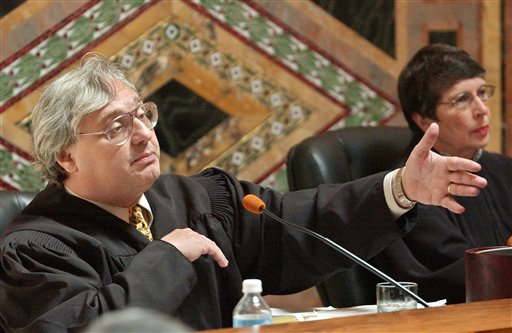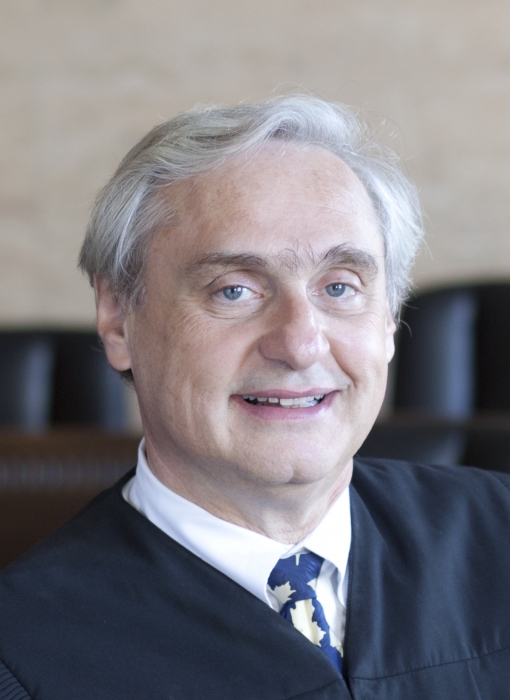Alex Kozinski (1950- ), was a judge on the Ninth U.S. Circuit Court of Appeals, where he served as chief from 2007-2014. He is well known for his cases and writings. These have been especially influential in the areas of commercial speech and the right of publicity.
Born in Bucharest, Romania, Kozinski fled with his parents first to Vienna and then to Hollywood, California, where he was reared and where he became a U.S. citizen in 1968.
Kozinski excelled at the University of California at Los Angeles, including its law school — he was managing editor of its law review.
Reagan nominated Kozinski for 9th Circuit Court
After obtaining his law degree, he clerked for Judge Anthony M. Kennedy at the Ninth U.S. Circuit Court of Appeals and then for Chief Justice Warren E. Burger at the Supreme Court before working as a private attorney and serving in the Ronald Reagan administration.
In 1982 Reagan nominated Kozinski to serve as chief judge of the U.S. Court of Federal Claims. Reagan nominated him again in 1985, this time to the Ninth Circuit Court of Appeals, where at age 35, Kozinski was the youngest judge to serve at that level since William Howard Taft had served in 1892.
While serving on the court, Kozinski has used the cases appearing before it and law reviews to press for expanded freedom of speech. For example, in Duran v. City of Douglas (9th Cir. 1990) he ruled that a citizen had the right to direct an obscene hand gesture toward police officers.
Kozinski known as defender of commercial speech
Kozinski has been a special defender of commercial speech, which he believes the Supreme Court unduly narrowed in Central Hudson Gas and Electric Corp. v. Public Service Commission (1980). Scholar Mitch Sollenberger has observed that Kozinski’s coauthored 1990 article “Who’s Afraid of Commercial Speech?” in the Virginia Law Review has been cited more than a hundred times in other law review articles (Sollenberger 2003: 444). Supreme Court Justice Clarence Thomas has championed commercial speech positions similar to those taken by Kozinski at the Ninth Circuit.
Other cases have demonstrated his free speech and right of publicity concerns:
- In Planned Parenthood of the Columbia/Willamette, Inc. v. American Coalition of Life Activists (9th Cir. 2002), Kozinski was in the 6-5 minority; he would have rejected the civil suit against the publishers of posters and a Web site that provided personal information on abortion providers.
- Similarly, Kozinski dissented in Harper v. Poway Unified School District (9th Cir. 2006), a decision that the Supreme Court later vacated. The majority decision had disciplined a student for wearing a T-shirt with an anti-gay message.
- In Vanna White v. Samsung Electronics America (9th Cir. 1993), Kozinski thought the circuit court took the right of publicity too far when it allowed television hostess Vanna White to collect damages against a robot wearing a dress and designed to imitate her.

Judge Alex Kozinski, of the Ninth U.S. Circuit Court of Appeals, gestures in this 2003 photo. Kozinski examined the limits of protections in Fair Housing Council v. Roommates.com (9th Cir. 2008). He ruled that Roommates.com had created a survey that allowed discrimination in violation of the Fair Housing Act of 1968. He said that the website through the survery had become more thatn a “passive transmitter of information provided by others.” (AP Photo/Paul Sakuma)
Kozinski examined the limits of protection for websites
Kozinski examined the reach of the limits of Section 230 of the Communications Decency Act in Fair Housing Council v. Roommates.com (9th Cir. 2008).
Section 230 provides interactive service providers and websites immunity for information posted by other entities. However, in this case, Kozinski reasoned that Roommates.com was not entitled to Section 230 immunity, because it was the information content provider.
Roommates.com had created a series of questions and answers that allowed individuals to express roommate preferences on a discriminatory basis arguably in violation of the Fair Housing Act of 1968.
“By requiring subscribers to provide the information as a condition of accessing its service, and by providing a limited set of pre-populated answers, Roommate becomes much more than a passive transmitter of information provided by others,” Kozinski explained. “It becomes the developer, at least in part, of that information.”
Kozinski: Inmates should be free from retaliatory punishment
Kozinski also showed sensitivity to the reality of retaliation in the prison context in Shepard v. Quillen (9th Cir. 2016). He reasoned that prison officials were not entitled to qualified immunity when they placed an inmate in segregation shortly after the inmate complained about official misconduct. He wrote that an inmate’s right to be free from retaliatory punishment was clearly established law.
In a 1998 interview, Kozinski expressed his concern about sexual harassment laws, attempts to ban flag burning by constitutional amendment, and congressional attempts to regulate Internet pornography. In the interview, Kozinski observed: “To me, the First Amendment stands for the basic principle that the government does not decide what citizens can say, speak, write or read” (Hudson 1998).
Kozinski resigned amid sexual misconduct controversy
Kozinski retired in December 2017 after an inquiry was opened into sexual misconduct allegations against him. The inquiry was stopped after Kozinski resigned because the court could only investigate current judges under the Judicial Conduct and Disability Act of 1980,
“In sum, within the space of three days, the Chief Justice transferred the proceeding to the Second Circuit Judicial Council and then-Judge Kozinski resigned, completely relinquishing his office, placing himself outside the parameters of the Act and precluding any inquiry by the Judicial Council. Because the Judicial Council is without statutory authority to do anything more, we must close this matter,” the Second Circuit Court wrote.
“Family and friends have urged me to stay on, at least long enough to defend myself. But I cannot be an effective judge and simultaneously fight this battle. Nor would such a battle be good for my beloved federal judiciary. And so I am making the decision to retire, effective immediately,” Konzinski said in a statement on Dec. 18, 2017.
John Vile is a professor of political science and dean of the Honors College at Middle Tennessee State University. He is co-editor of the Encyclopedia of the First Amendment. This article was originally published in 2009.

